Perspectives on Mental Health: Biomedical, Behavioral, and Beyond
VerifiedAdded on 2023/05/31
|8
|1757
|421
Essay
AI Summary
This essay provides an in-depth analysis of various psychological perspectives, offering a comprehensive overview of their core principles and applications in understanding mental health. It examines the behavioral perspective, emphasizing environmental control of behavior and aversion therapy; the cognitive perspective, focusing on cognitive distortions and treatment approaches; and the psychodynamic perspective, highlighting repressed emotions and past experiences. The essay also delves into the biomedical perspective, which emphasizes biological factors and pharmacological interventions. It critically evaluates the strengths and limitations of each perspective, including ethical considerations and the ongoing debate regarding the causes and treatments of mental disorders, such as the role of neurotransmitters like serotonin. Furthermore, it highlights the importance of comprehending alternative perspectives in mental health for diagnosing and treating mental health issues. This essay is a comparative analysis of different approaches to understanding and addressing psychological issues.
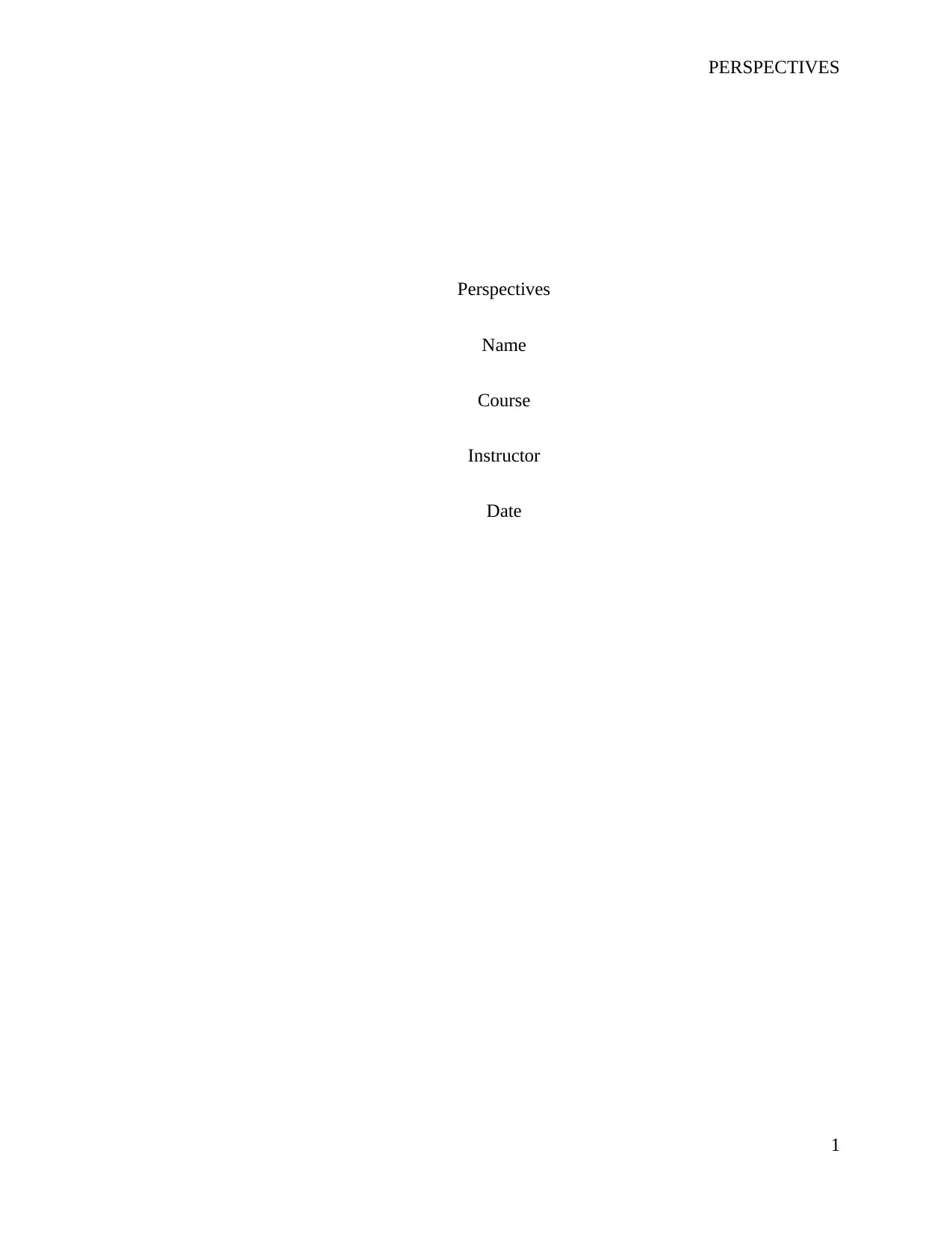
PERSPECTIVES
Perspectives
Name
Course
Instructor
Date
1
Perspectives
Name
Course
Instructor
Date
1
Paraphrase This Document
Need a fresh take? Get an instant paraphrase of this document with our AI Paraphraser
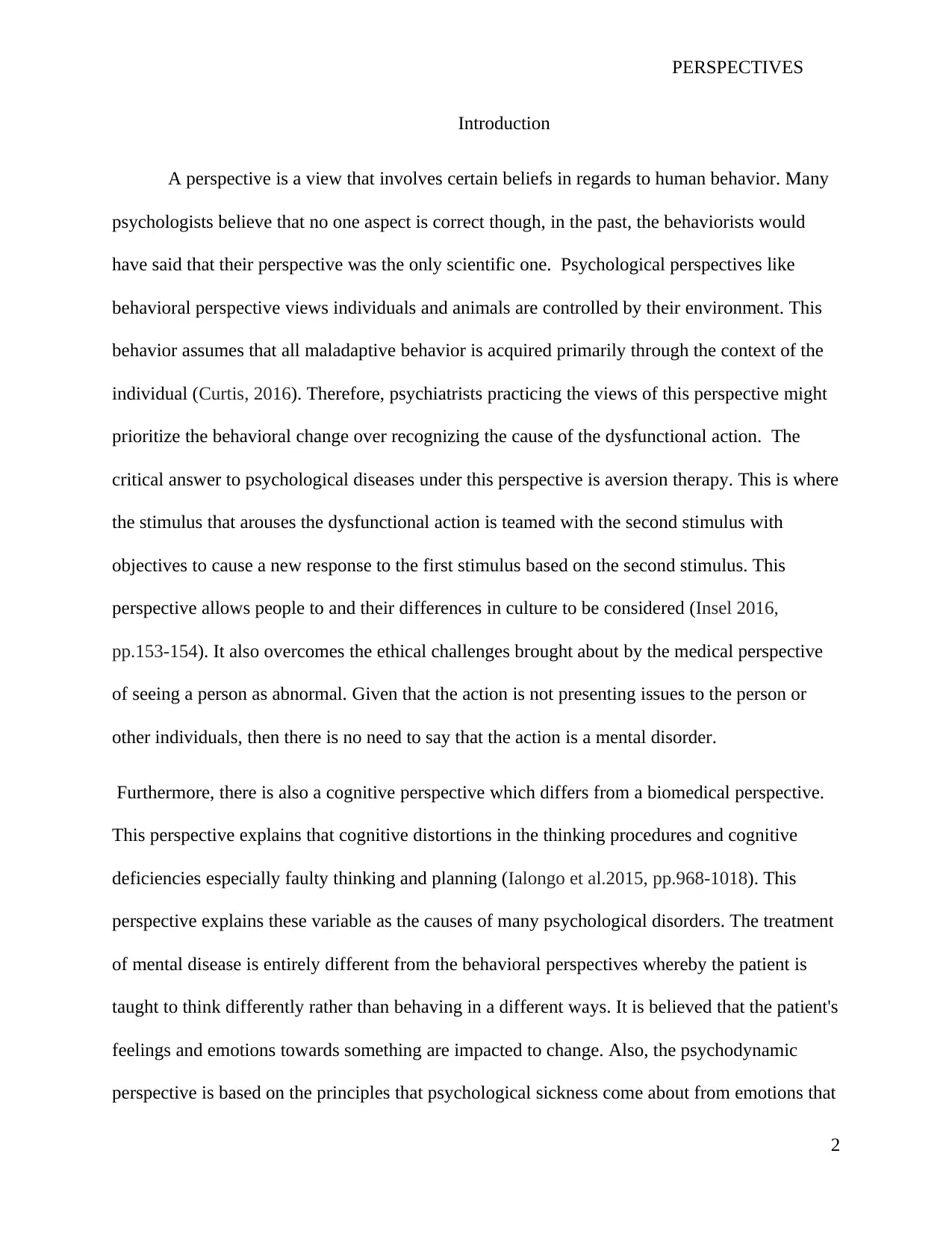
PERSPECTIVES
Introduction
A perspective is a view that involves certain beliefs in regards to human behavior. Many
psychologists believe that no one aspect is correct though, in the past, the behaviorists would
have said that their perspective was the only scientific one. Psychological perspectives like
behavioral perspective views individuals and animals are controlled by their environment. This
behavior assumes that all maladaptive behavior is acquired primarily through the context of the
individual (Curtis, 2016). Therefore, psychiatrists practicing the views of this perspective might
prioritize the behavioral change over recognizing the cause of the dysfunctional action. The
critical answer to psychological diseases under this perspective is aversion therapy. This is where
the stimulus that arouses the dysfunctional action is teamed with the second stimulus with
objectives to cause a new response to the first stimulus based on the second stimulus. This
perspective allows people to and their differences in culture to be considered (Insel 2016,
pp.153-154). It also overcomes the ethical challenges brought about by the medical perspective
of seeing a person as abnormal. Given that the action is not presenting issues to the person or
other individuals, then there is no need to say that the action is a mental disorder.
Furthermore, there is also a cognitive perspective which differs from a biomedical perspective.
This perspective explains that cognitive distortions in the thinking procedures and cognitive
deficiencies especially faulty thinking and planning (Ialongo et al.2015, pp.968-1018). This
perspective explains these variable as the causes of many psychological disorders. The treatment
of mental disease is entirely different from the behavioral perspectives whereby the patient is
taught to think differently rather than behaving in a different ways. It is believed that the patient's
feelings and emotions towards something are impacted to change. Also, the psychodynamic
perspective is based on the principles that psychological sickness come about from emotions that
2
Introduction
A perspective is a view that involves certain beliefs in regards to human behavior. Many
psychologists believe that no one aspect is correct though, in the past, the behaviorists would
have said that their perspective was the only scientific one. Psychological perspectives like
behavioral perspective views individuals and animals are controlled by their environment. This
behavior assumes that all maladaptive behavior is acquired primarily through the context of the
individual (Curtis, 2016). Therefore, psychiatrists practicing the views of this perspective might
prioritize the behavioral change over recognizing the cause of the dysfunctional action. The
critical answer to psychological diseases under this perspective is aversion therapy. This is where
the stimulus that arouses the dysfunctional action is teamed with the second stimulus with
objectives to cause a new response to the first stimulus based on the second stimulus. This
perspective allows people to and their differences in culture to be considered (Insel 2016,
pp.153-154). It also overcomes the ethical challenges brought about by the medical perspective
of seeing a person as abnormal. Given that the action is not presenting issues to the person or
other individuals, then there is no need to say that the action is a mental disorder.
Furthermore, there is also a cognitive perspective which differs from a biomedical perspective.
This perspective explains that cognitive distortions in the thinking procedures and cognitive
deficiencies especially faulty thinking and planning (Ialongo et al.2015, pp.968-1018). This
perspective explains these variable as the causes of many psychological disorders. The treatment
of mental disease is entirely different from the behavioral perspectives whereby the patient is
taught to think differently rather than behaving in a different ways. It is believed that the patient's
feelings and emotions towards something are impacted to change. Also, the psychodynamic
perspective is based on the principles that psychological sickness come about from emotions that
2
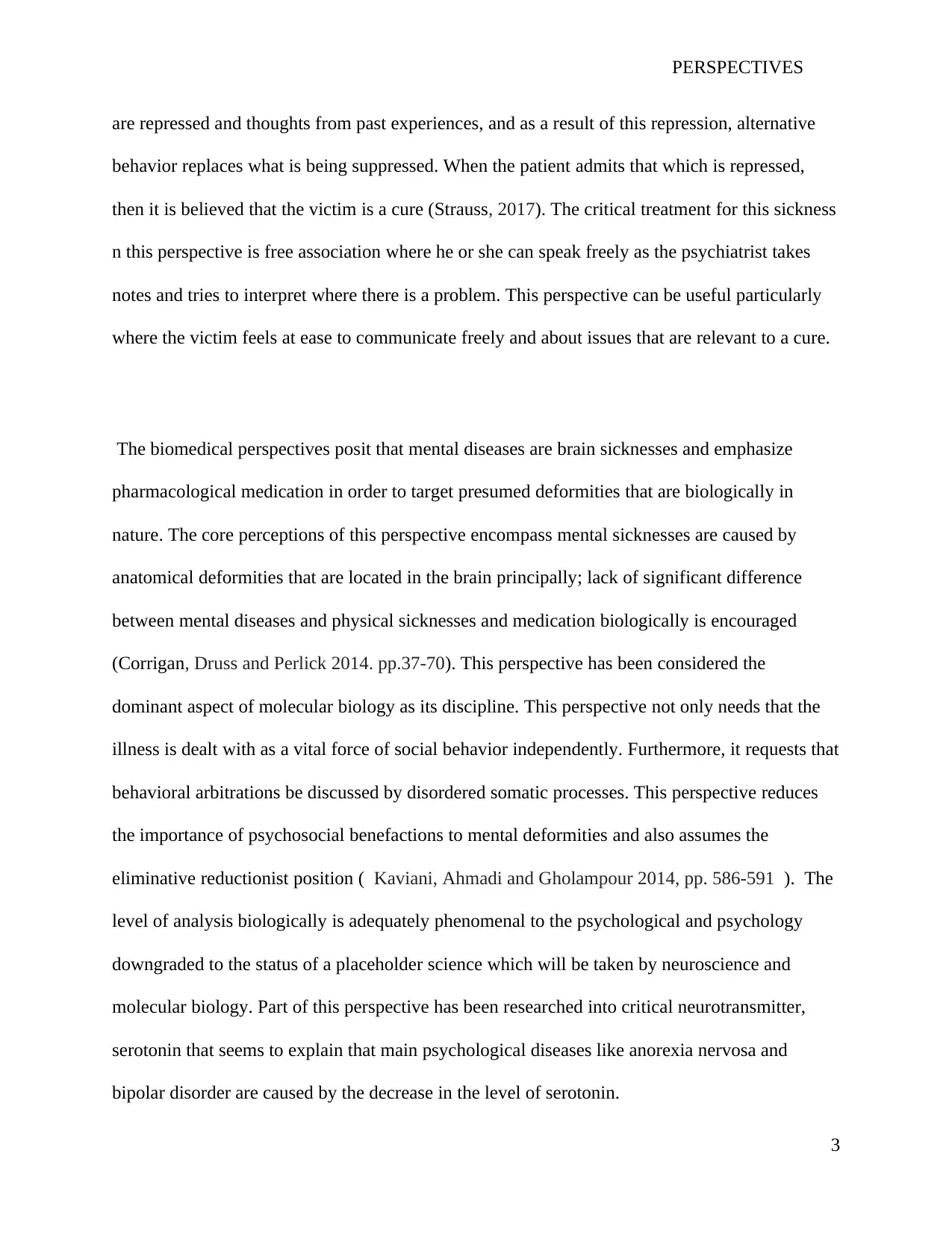
PERSPECTIVES
are repressed and thoughts from past experiences, and as a result of this repression, alternative
behavior replaces what is being suppressed. When the patient admits that which is repressed,
then it is believed that the victim is a cure (Strauss, 2017). The critical treatment for this sickness
n this perspective is free association where he or she can speak freely as the psychiatrist takes
notes and tries to interpret where there is a problem. This perspective can be useful particularly
where the victim feels at ease to communicate freely and about issues that are relevant to a cure.
The biomedical perspectives posit that mental diseases are brain sicknesses and emphasize
pharmacological medication in order to target presumed deformities that are biologically in
nature. The core perceptions of this perspective encompass mental sicknesses are caused by
anatomical deformities that are located in the brain principally; lack of significant difference
between mental diseases and physical sicknesses and medication biologically is encouraged
(Corrigan, Druss and Perlick 2014. pp.37-70). This perspective has been considered the
dominant aspect of molecular biology as its discipline. This perspective not only needs that the
illness is dealt with as a vital force of social behavior independently. Furthermore, it requests that
behavioral arbitrations be discussed by disordered somatic processes. This perspective reduces
the importance of psychosocial benefactions to mental deformities and also assumes the
eliminative reductionist position ( Kaviani, Ahmadi and Gholampour 2014, pp. 586-591 ). The
level of analysis biologically is adequately phenomenal to the psychological and psychology
downgraded to the status of a placeholder science which will be taken by neuroscience and
molecular biology. Part of this perspective has been researched into critical neurotransmitter,
serotonin that seems to explain that main psychological diseases like anorexia nervosa and
bipolar disorder are caused by the decrease in the level of serotonin.
3
are repressed and thoughts from past experiences, and as a result of this repression, alternative
behavior replaces what is being suppressed. When the patient admits that which is repressed,
then it is believed that the victim is a cure (Strauss, 2017). The critical treatment for this sickness
n this perspective is free association where he or she can speak freely as the psychiatrist takes
notes and tries to interpret where there is a problem. This perspective can be useful particularly
where the victim feels at ease to communicate freely and about issues that are relevant to a cure.
The biomedical perspectives posit that mental diseases are brain sicknesses and emphasize
pharmacological medication in order to target presumed deformities that are biologically in
nature. The core perceptions of this perspective encompass mental sicknesses are caused by
anatomical deformities that are located in the brain principally; lack of significant difference
between mental diseases and physical sicknesses and medication biologically is encouraged
(Corrigan, Druss and Perlick 2014. pp.37-70). This perspective has been considered the
dominant aspect of molecular biology as its discipline. This perspective not only needs that the
illness is dealt with as a vital force of social behavior independently. Furthermore, it requests that
behavioral arbitrations be discussed by disordered somatic processes. This perspective reduces
the importance of psychosocial benefactions to mental deformities and also assumes the
eliminative reductionist position ( Kaviani, Ahmadi and Gholampour 2014, pp. 586-591 ). The
level of analysis biologically is adequately phenomenal to the psychological and psychology
downgraded to the status of a placeholder science which will be taken by neuroscience and
molecular biology. Part of this perspective has been researched into critical neurotransmitter,
serotonin that seems to explain that main psychological diseases like anorexia nervosa and
bipolar disorder are caused by the decrease in the level of serotonin.
3
⊘ This is a preview!⊘
Do you want full access?
Subscribe today to unlock all pages.

Trusted by 1+ million students worldwide
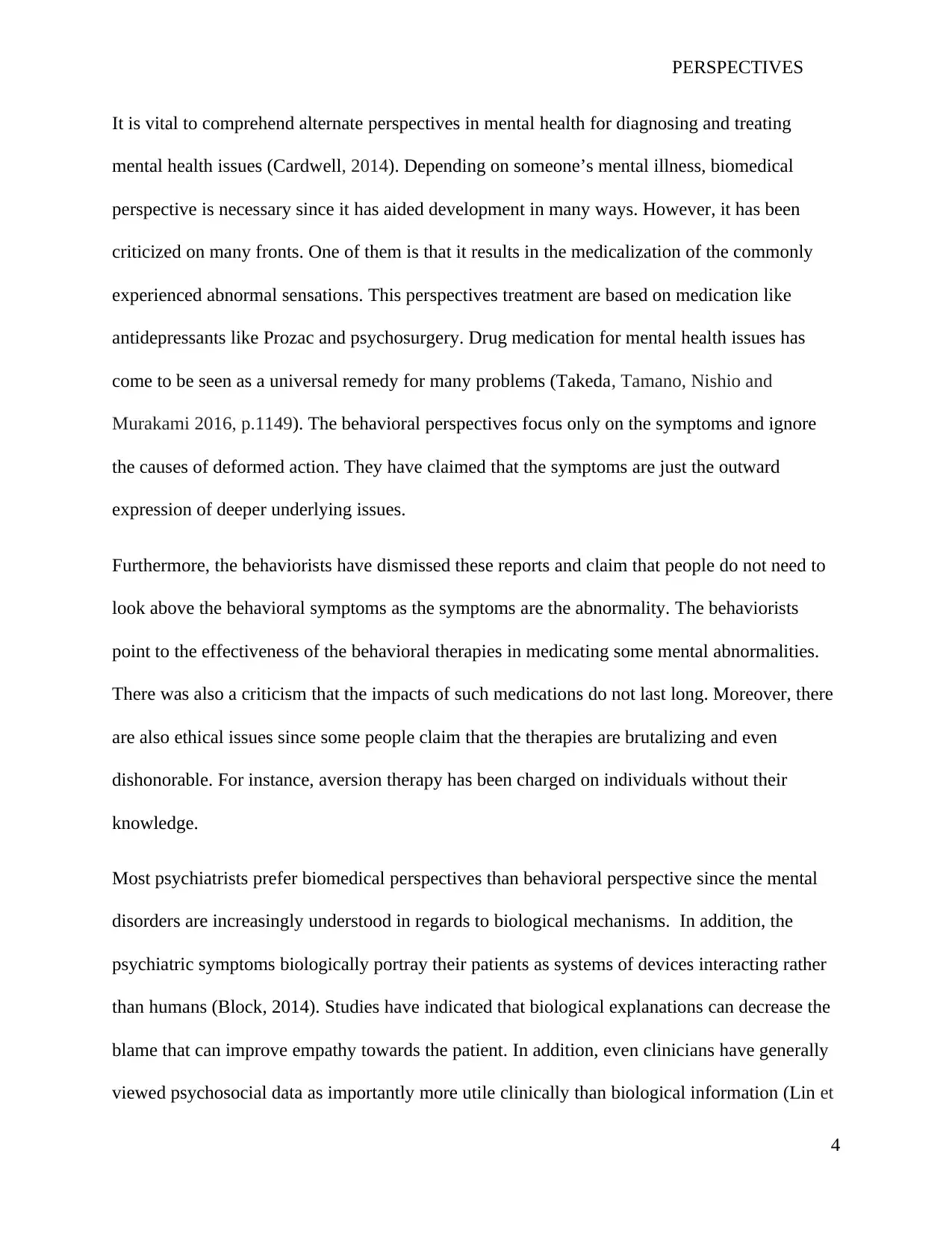
PERSPECTIVES
It is vital to comprehend alternate perspectives in mental health for diagnosing and treating
mental health issues (Cardwell, 2014). Depending on someone’s mental illness, biomedical
perspective is necessary since it has aided development in many ways. However, it has been
criticized on many fronts. One of them is that it results in the medicalization of the commonly
experienced abnormal sensations. This perspectives treatment are based on medication like
antidepressants like Prozac and psychosurgery. Drug medication for mental health issues has
come to be seen as a universal remedy for many problems (Takeda, Tamano, Nishio and
Murakami 2016, p.1149). The behavioral perspectives focus only on the symptoms and ignore
the causes of deformed action. They have claimed that the symptoms are just the outward
expression of deeper underlying issues.
Furthermore, the behaviorists have dismissed these reports and claim that people do not need to
look above the behavioral symptoms as the symptoms are the abnormality. The behaviorists
point to the effectiveness of the behavioral therapies in medicating some mental abnormalities.
There was also a criticism that the impacts of such medications do not last long. Moreover, there
are also ethical issues since some people claim that the therapies are brutalizing and even
dishonorable. For instance, aversion therapy has been charged on individuals without their
knowledge.
Most psychiatrists prefer biomedical perspectives than behavioral perspective since the mental
disorders are increasingly understood in regards to biological mechanisms. In addition, the
psychiatric symptoms biologically portray their patients as systems of devices interacting rather
than humans (Block, 2014). Studies have indicated that biological explanations can decrease the
blame that can improve empathy towards the patient. In addition, even clinicians have generally
viewed psychosocial data as importantly more utile clinically than biological information (Lin et
4
It is vital to comprehend alternate perspectives in mental health for diagnosing and treating
mental health issues (Cardwell, 2014). Depending on someone’s mental illness, biomedical
perspective is necessary since it has aided development in many ways. However, it has been
criticized on many fronts. One of them is that it results in the medicalization of the commonly
experienced abnormal sensations. This perspectives treatment are based on medication like
antidepressants like Prozac and psychosurgery. Drug medication for mental health issues has
come to be seen as a universal remedy for many problems (Takeda, Tamano, Nishio and
Murakami 2016, p.1149). The behavioral perspectives focus only on the symptoms and ignore
the causes of deformed action. They have claimed that the symptoms are just the outward
expression of deeper underlying issues.
Furthermore, the behaviorists have dismissed these reports and claim that people do not need to
look above the behavioral symptoms as the symptoms are the abnormality. The behaviorists
point to the effectiveness of the behavioral therapies in medicating some mental abnormalities.
There was also a criticism that the impacts of such medications do not last long. Moreover, there
are also ethical issues since some people claim that the therapies are brutalizing and even
dishonorable. For instance, aversion therapy has been charged on individuals without their
knowledge.
Most psychiatrists prefer biomedical perspectives than behavioral perspective since the mental
disorders are increasingly understood in regards to biological mechanisms. In addition, the
psychiatric symptoms biologically portray their patients as systems of devices interacting rather
than humans (Block, 2014). Studies have indicated that biological explanations can decrease the
blame that can improve empathy towards the patient. In addition, even clinicians have generally
viewed psychosocial data as importantly more utile clinically than biological information (Lin et
4
Paraphrase This Document
Need a fresh take? Get an instant paraphrase of this document with our AI Paraphraser
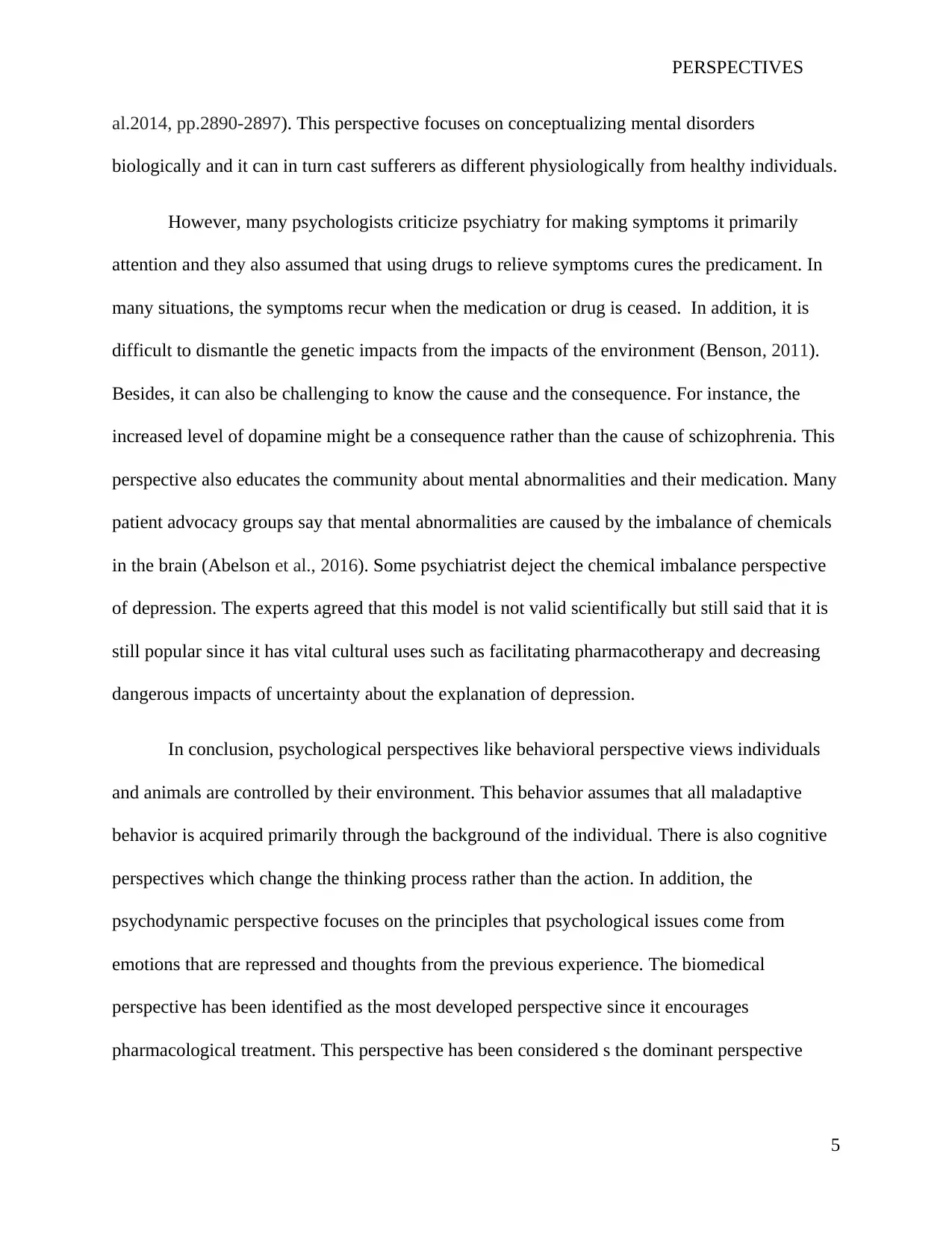
PERSPECTIVES
al.2014, pp.2890-2897). This perspective focuses on conceptualizing mental disorders
biologically and it can in turn cast sufferers as different physiologically from healthy individuals.
However, many psychologists criticize psychiatry for making symptoms it primarily
attention and they also assumed that using drugs to relieve symptoms cures the predicament. In
many situations, the symptoms recur when the medication or drug is ceased. In addition, it is
difficult to dismantle the genetic impacts from the impacts of the environment (Benson, 2011).
Besides, it can also be challenging to know the cause and the consequence. For instance, the
increased level of dopamine might be a consequence rather than the cause of schizophrenia. This
perspective also educates the community about mental abnormalities and their medication. Many
patient advocacy groups say that mental abnormalities are caused by the imbalance of chemicals
in the brain (Abelson et al., 2016). Some psychiatrist deject the chemical imbalance perspective
of depression. The experts agreed that this model is not valid scientifically but still said that it is
still popular since it has vital cultural uses such as facilitating pharmacotherapy and decreasing
dangerous impacts of uncertainty about the explanation of depression.
In conclusion, psychological perspectives like behavioral perspective views individuals
and animals are controlled by their environment. This behavior assumes that all maladaptive
behavior is acquired primarily through the background of the individual. There is also cognitive
perspectives which change the thinking process rather than the action. In addition, the
psychodynamic perspective focuses on the principles that psychological issues come from
emotions that are repressed and thoughts from the previous experience. The biomedical
perspective has been identified as the most developed perspective since it encourages
pharmacological treatment. This perspective has been considered s the dominant perspective
5
al.2014, pp.2890-2897). This perspective focuses on conceptualizing mental disorders
biologically and it can in turn cast sufferers as different physiologically from healthy individuals.
However, many psychologists criticize psychiatry for making symptoms it primarily
attention and they also assumed that using drugs to relieve symptoms cures the predicament. In
many situations, the symptoms recur when the medication or drug is ceased. In addition, it is
difficult to dismantle the genetic impacts from the impacts of the environment (Benson, 2011).
Besides, it can also be challenging to know the cause and the consequence. For instance, the
increased level of dopamine might be a consequence rather than the cause of schizophrenia. This
perspective also educates the community about mental abnormalities and their medication. Many
patient advocacy groups say that mental abnormalities are caused by the imbalance of chemicals
in the brain (Abelson et al., 2016). Some psychiatrist deject the chemical imbalance perspective
of depression. The experts agreed that this model is not valid scientifically but still said that it is
still popular since it has vital cultural uses such as facilitating pharmacotherapy and decreasing
dangerous impacts of uncertainty about the explanation of depression.
In conclusion, psychological perspectives like behavioral perspective views individuals
and animals are controlled by their environment. This behavior assumes that all maladaptive
behavior is acquired primarily through the background of the individual. There is also cognitive
perspectives which change the thinking process rather than the action. In addition, the
psychodynamic perspective focuses on the principles that psychological issues come from
emotions that are repressed and thoughts from the previous experience. The biomedical
perspective has been identified as the most developed perspective since it encourages
pharmacological treatment. This perspective has been considered s the dominant perspective
5

PERSPECTIVES
with molecular biology as its discipline. The behavioral perspectives focus only on the symptoms
and ignore the causes of abnormal behavior.
6
with molecular biology as its discipline. The behavioral perspectives focus only on the symptoms
and ignore the causes of abnormal behavior.
6
⊘ This is a preview!⊘
Do you want full access?
Subscribe today to unlock all pages.

Trusted by 1+ million students worldwide
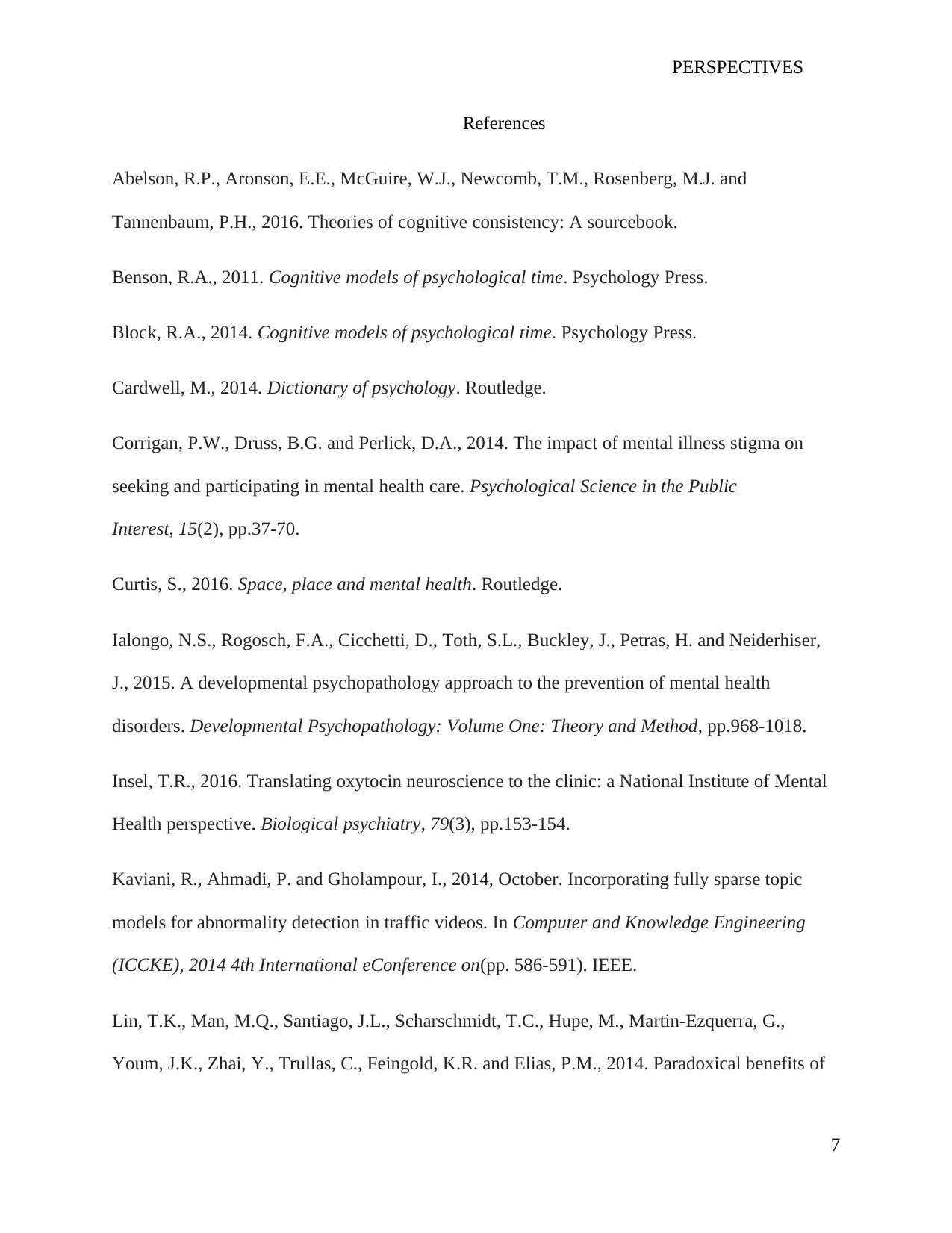
PERSPECTIVES
References
Abelson, R.P., Aronson, E.E., McGuire, W.J., Newcomb, T.M., Rosenberg, M.J. and
Tannenbaum, P.H., 2016. Theories of cognitive consistency: A sourcebook.
Benson, R.A., 2011. Cognitive models of psychological time. Psychology Press.
Block, R.A., 2014. Cognitive models of psychological time. Psychology Press.
Cardwell, M., 2014. Dictionary of psychology. Routledge.
Corrigan, P.W., Druss, B.G. and Perlick, D.A., 2014. The impact of mental illness stigma on
seeking and participating in mental health care. Psychological Science in the Public
Interest, 15(2), pp.37-70.
Curtis, S., 2016. Space, place and mental health. Routledge.
Ialongo, N.S., Rogosch, F.A., Cicchetti, D., Toth, S.L., Buckley, J., Petras, H. and Neiderhiser,
J., 2015. A developmental psychopathology approach to the prevention of mental health
disorders. Developmental Psychopathology: Volume One: Theory and Method, pp.968-1018.
Insel, T.R., 2016. Translating oxytocin neuroscience to the clinic: a National Institute of Mental
Health perspective. Biological psychiatry, 79(3), pp.153-154.
Kaviani, R., Ahmadi, P. and Gholampour, I., 2014, October. Incorporating fully sparse topic
models for abnormality detection in traffic videos. In Computer and Knowledge Engineering
(ICCKE), 2014 4th International eConference on(pp. 586-591). IEEE.
Lin, T.K., Man, M.Q., Santiago, J.L., Scharschmidt, T.C., Hupe, M., Martin-Ezquerra, G.,
Youm, J.K., Zhai, Y., Trullas, C., Feingold, K.R. and Elias, P.M., 2014. Paradoxical benefits of
7
References
Abelson, R.P., Aronson, E.E., McGuire, W.J., Newcomb, T.M., Rosenberg, M.J. and
Tannenbaum, P.H., 2016. Theories of cognitive consistency: A sourcebook.
Benson, R.A., 2011. Cognitive models of psychological time. Psychology Press.
Block, R.A., 2014. Cognitive models of psychological time. Psychology Press.
Cardwell, M., 2014. Dictionary of psychology. Routledge.
Corrigan, P.W., Druss, B.G. and Perlick, D.A., 2014. The impact of mental illness stigma on
seeking and participating in mental health care. Psychological Science in the Public
Interest, 15(2), pp.37-70.
Curtis, S., 2016. Space, place and mental health. Routledge.
Ialongo, N.S., Rogosch, F.A., Cicchetti, D., Toth, S.L., Buckley, J., Petras, H. and Neiderhiser,
J., 2015. A developmental psychopathology approach to the prevention of mental health
disorders. Developmental Psychopathology: Volume One: Theory and Method, pp.968-1018.
Insel, T.R., 2016. Translating oxytocin neuroscience to the clinic: a National Institute of Mental
Health perspective. Biological psychiatry, 79(3), pp.153-154.
Kaviani, R., Ahmadi, P. and Gholampour, I., 2014, October. Incorporating fully sparse topic
models for abnormality detection in traffic videos. In Computer and Knowledge Engineering
(ICCKE), 2014 4th International eConference on(pp. 586-591). IEEE.
Lin, T.K., Man, M.Q., Santiago, J.L., Scharschmidt, T.C., Hupe, M., Martin-Ezquerra, G.,
Youm, J.K., Zhai, Y., Trullas, C., Feingold, K.R. and Elias, P.M., 2014. Paradoxical benefits of
7
Paraphrase This Document
Need a fresh take? Get an instant paraphrase of this document with our AI Paraphraser
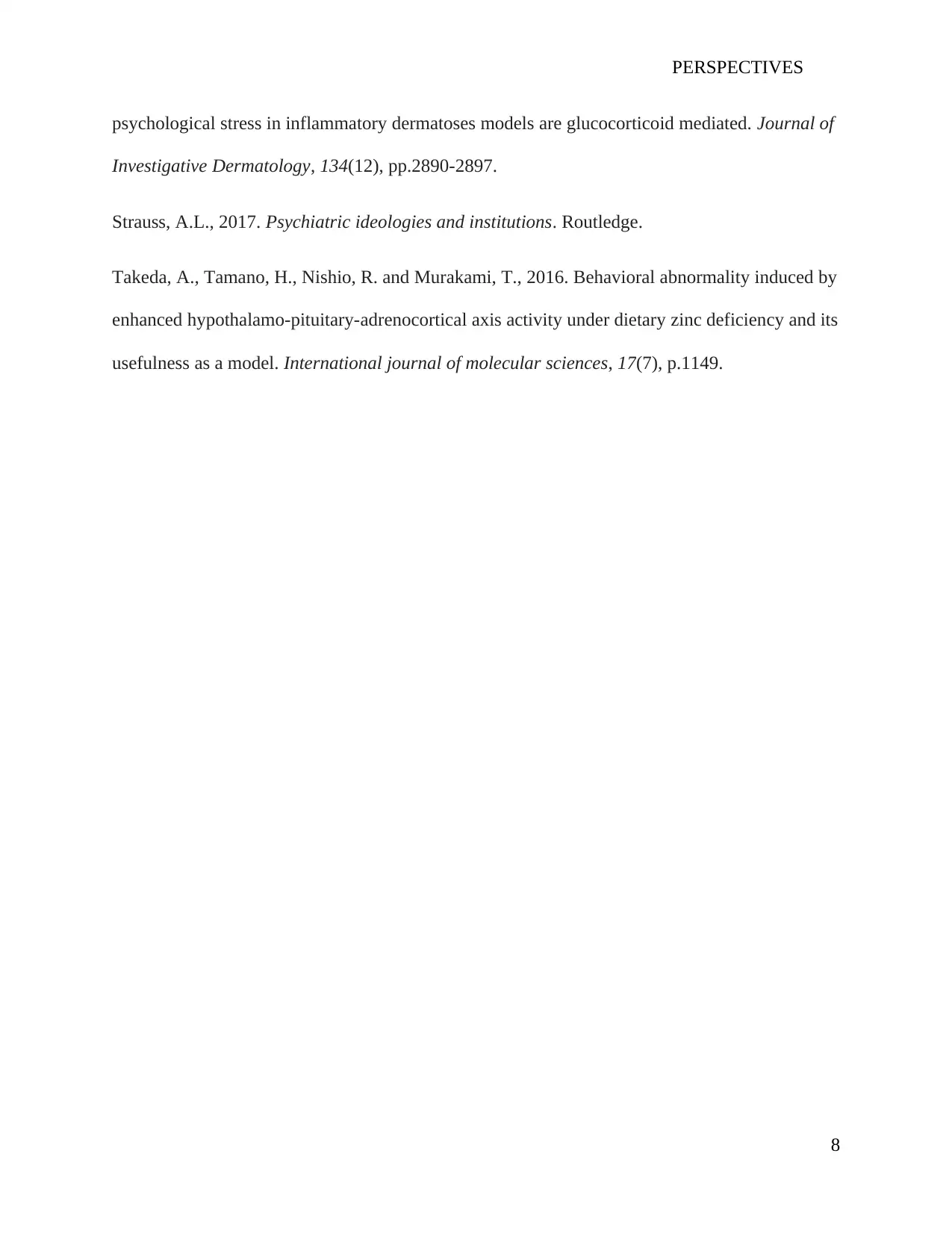
PERSPECTIVES
psychological stress in inflammatory dermatoses models are glucocorticoid mediated. Journal of
Investigative Dermatology, 134(12), pp.2890-2897.
Strauss, A.L., 2017. Psychiatric ideologies and institutions. Routledge.
Takeda, A., Tamano, H., Nishio, R. and Murakami, T., 2016. Behavioral abnormality induced by
enhanced hypothalamo-pituitary-adrenocortical axis activity under dietary zinc deficiency and its
usefulness as a model. International journal of molecular sciences, 17(7), p.1149.
8
psychological stress in inflammatory dermatoses models are glucocorticoid mediated. Journal of
Investigative Dermatology, 134(12), pp.2890-2897.
Strauss, A.L., 2017. Psychiatric ideologies and institutions. Routledge.
Takeda, A., Tamano, H., Nishio, R. and Murakami, T., 2016. Behavioral abnormality induced by
enhanced hypothalamo-pituitary-adrenocortical axis activity under dietary zinc deficiency and its
usefulness as a model. International journal of molecular sciences, 17(7), p.1149.
8
1 out of 8
Related Documents
Your All-in-One AI-Powered Toolkit for Academic Success.
+13062052269
info@desklib.com
Available 24*7 on WhatsApp / Email
![[object Object]](/_next/static/media/star-bottom.7253800d.svg)
Unlock your academic potential
Copyright © 2020–2026 A2Z Services. All Rights Reserved. Developed and managed by ZUCOL.





